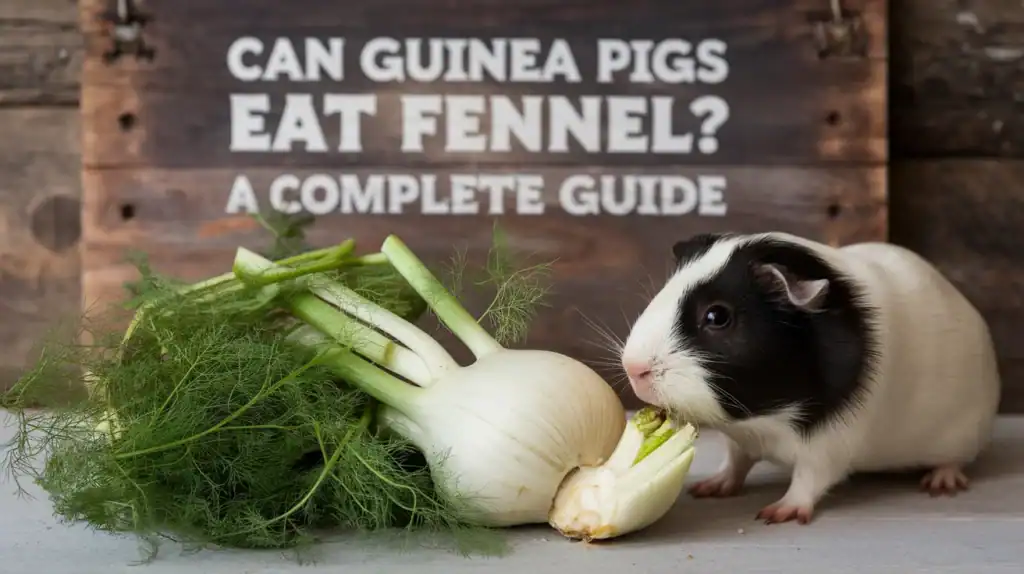Guinea pigs thrive on a diet rich in fresh vegetables, but not all veggies are safe for them. One common question among guinea pig owners is: Can guinea pigs eat fennel? This article will provide an in-depth look at fennel’s nutritional value, benefits, risks, and how to safely introduce it into your guinea pig’s diet.
What Is Fennel?
Fennel (Foeniculum vulgare) is a bulbous, aromatic vegetable commonly used in cooking. It has a mild, licorice-like flavor and is rich in nutrients. The plant consists of three main parts:
- Bulb – The white, crunchy base, often used in salads and cooked dishes.
- Stalks – The fibrous green stems that extend from the bulb.
- Fronds – The feathery green leaves resembling dill.
- Seeds – Small, dry seeds used as a spice.
Is Every Part of Fennel Safe for Guinea Pigs?
| Fennel Part | Safe for Guinea Pigs? | Notes |
| Bulb | ✅ Yes | Low in sugar, rich in fiber |
| Stalks | ✅ Yes | Safe in moderation, slightly fibrous |
| Fronds | ✅ Yes | Rich in vitamins, safe to eat |
| Seeds | ❌ No | Too high in fat and difficult to digest |
Nutritional Breakdown of Fennel
Understanding the nutrients in fennel can help determine if it fits into a guinea pig’s diet. Below is a nutritional table based on a 100g serving of raw fennel:
| Nutrient | Amount | Importance for Guinea Pigs |
| Calories | 31 kcal | Low-calorie snack |
| Fiber | 3.1 g | Supports digestion |
| Vitamin C | 12 mg | Essential for guinea pig health |
| Calcium | 49 mg | Moderate; excess can cause bladder stones |
| Sugar | 3.9 g | Low compared to other veggies |
| Water | 90% | Hydrating and refreshing |
Is Fennel Safe for Guinea Pigs?
Yes, guinea pigs can eat fennel, but in moderation. It is a safe, nutritious vegetable that offers hydration, vitamins, and fiber. However, certain precautions should be taken to ensure their health.
Health Benefits of Feeding Fennel to Guinea Pigs
Fennel provides several advantages for guinea pigs, making it a good addition to their diet.
1. Rich in Fiber for Digestion
Guinea pigs require a high-fiber diet to maintain healthy digestion. Fennel contains 3.1g of fiber per 100g, which supports gut health and prevents constipation.
2. Supports Immune System with Vitamin C
Guinea pigs cannot produce vitamin C, making it a necessary dietary component. Fennel provides 12mg of vitamin C per 100g, helping prevent scurvy, a common guinea pig illness.
3. Hydrating and Refreshing
Since fennel is 90% water, it can help keep guinea pigs hydrated, especially in hot weather.
4. Low in Sugar
With only 3.9g of sugar per 100g, fennel is safer than many other vegetables that have higher sugar content.
Potential Risks of Feeding Fennel
Although fennel has benefits, there are also risks to be aware of.
1. Moderate Calcium Content
Fennel contains 49mg of calcium per 100g. While not excessively high, excess calcium in a guinea pig’s diet can lead to bladder or kidney stones. Avoid feeding fennel daily.
2. Possible Digestive Issues
Some guinea pigs may not tolerate fennel well, leading to bloating or gas. Always introduce it slowly and observe their reaction.
3. Stalks May Be Too Fibrous
The stalks can be quite tough, making them harder to chew and digest. It’s best to serve small, manageable pieces.
How Often Can Guinea Pigs Eat Fennel?
To prevent digestive issues and calcium buildup, follow these feeding guidelines:
- Serving Size: 1-2 thin slices of fennel bulb or a few fronds.
- Frequency: 2-3 times per week, but not daily.
- Monitor: Watch for any signs of bloating, diarrhea, or discomfort.
Comparing Fennel to Other Vegetables
How does fennel compare to other commonly fed guinea pig veggies?
| Vegetable | Vitamin C | Calcium | Sugar | Fiber |
| Fennel | 12mg | 49mg | 3.9g | 3.1g |
| Bell Pepper | 80mg | 10mg | 2.4g | 1.7g |
| Carrot | 6mg | 33mg | 4.7g | 2.8g |
| Lettuce (Romaine) | 4mg | 33mg | 1.2g | 1.2g |
How to Prepare Fennel for Guinea Pigs
- Wash thoroughly to remove pesticides.
- Cut into small pieces to avoid choking hazards.
- Avoid fennel seeds and cooked fennel.
- Mix with other vegetables for variety.
Summary: Pros & Cons of Feeding Fennel to Guinea Pigs
Pros:
✅ High in fiber for digestion
✅ Good vitamin C content
✅ Low in sugar
✅ Hydrating due to high water content
Cons:
❌ Moderate calcium levels – avoid excess
❌ Stalks can be fibrous and tough
❌ May cause bloating in some guinea pigs
Conclusion
Yes, guinea pigs can eat fennel, but it should be given in moderation due to its calcium content. It provides fiber, hydration, and vitamin C, making it a beneficial treat when fed 2-3 times per week. Always monitor your guinea pig’s reaction and provide a varied diet for optimal health.
FAQs
Can guinea pigs eat fennel seeds?
No, fennel seeds are too hard and high in fat, making them unsuitable for guinea pigs.
Can baby guinea pigs eat fennel?
Yes, but introduce it slowly and in tiny amounts to ensure they tolerate it well.
Can guinea pigs eat cooked fennel?
No, cooked vegetables lose essential nutrients and are harder for guinea pigs to digest.
How do I know if my guinea pig likes fennel?
If they eat it eagerly, they enjoy it. If they ignore it or show discomfort, avoid feeding it.
What should I do if my guinea pig has a bad reaction to fennel?
Stop feeding fennel immediately and consult a vet if symptoms persist.

